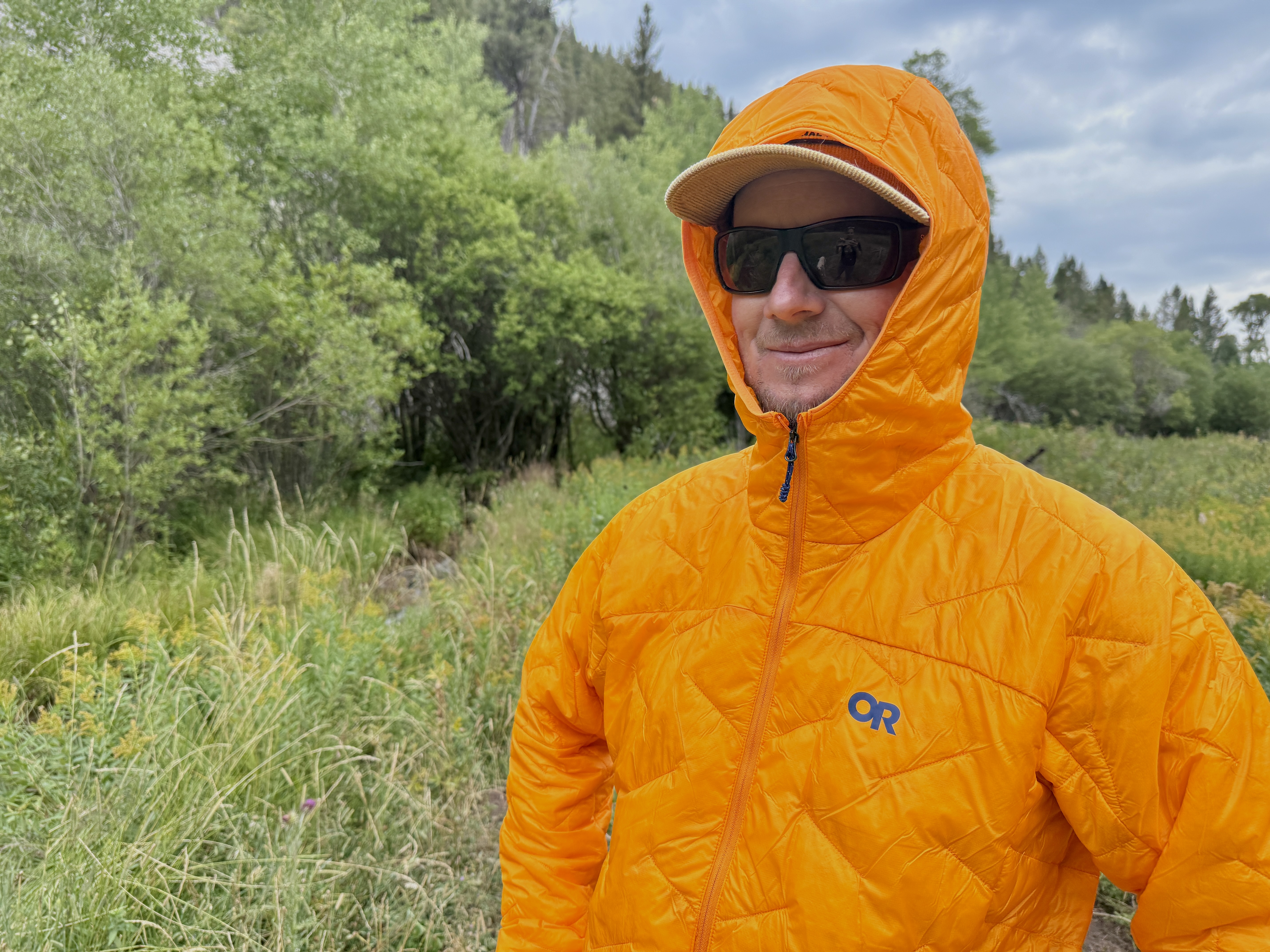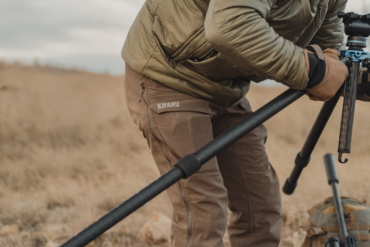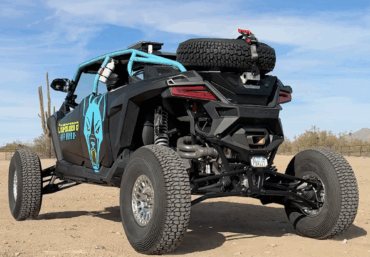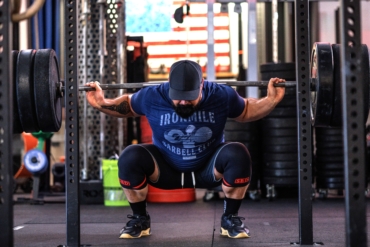Outdoor Research (OR) has a reputation for producing no-nonsense outerwear for hardcore alpinists, and GORE-TEX is a staple waterproof-breathable membrane for that audience. Gore released GORE-TEX Pro in 2020, and the big news was that this new version was stretchy.
Stretchy GORE-TEX? For this ice climber, that was great news — if it worked. I was dubious, especially of its durability. But I shoved them into my bag anyway as I packed for a trip to search for big ice first ascents in the backcountry of Alaska.
OR released the Archangel Collection last year. It touts the use of the new GORE-TEX Pro to “balance speed and efficiency without compromising protection.” I took the jacket and bibs to Alaska last month for a week of scouting and attempting ice first ascents in the backcountry. Here’s what I found.
Looking for a new hardshell jacket? Check out how the Archangel compares to the rest of our recommendations in our Best Hardshell Jackets Buyer’s Guide.

Outdoor Research Archangel: Stretch Where It Matters
OR uses the Stretch Technology version of GORE-TEX Pro (Gore claims 20% stretch) in the upper back, lower hood, knees, and crotch gusset.
The panels in the upper back were noticeable while poling during approach skiing and while ice climbing on harder pitches. I am broad across the shoulders for how small my torso is, and most men’s medium jackets are a bit tight across the upper back.
But the Outdoor Research Archangel jacket alleviated the usual tension. I could tell it came from the stretch panels because my backpack remained stationary; I can usually feel my pack moving horizontally when the upper back of my jacket is too tight.
The GORE-TEX Pro stretch crotch gusset was also a winner. On a memorable pitch, I had to stem over overhanging daggers to avoid possibly launching them off.
The move was at the limit of my hip mobility, but the bibs had no problem even when pinned under the leg loops of my harness. The stretchiness surely helped in this particular situation.

Same for the stretch panels in the knees. On the hardest pitch of the trip, I had to high step onto crazy mushroom formations at nearly crotch level.
I had my pants attached to my boots via a bungee cord through the eyelets in the lower hem to act as a “self gaiter,” which prevented them from riding up. The stretchy knees did the trick.

Breathability Everywhere Else
OR chose to use the breathable version of GORE-TEX Pro Most Breathable Technology elsewhere in the Archangel jacket and bibs. Breathability is the performance limiter for waterproof/breathable shells for me when the outing involves any physical effort beyond easy walking. So, this strategy made sense to me.
This Most Breathable Technology uses a lighter denier face fabric compared to the GORE-TEX Pro Most Rugged Technology. I had another shell that was entirely made of the more rugged version, and the lighter weight and softer hand of the fabric were obvious. The Most Breathable Technology fabric was easier to move in while the Most Rugged Technolgy fabric felt stiff and crinkly.
But the “enhanced breathability” was hard to quantify. According to Gore, the Most Breathable Technology tests out to the same ISO 11092 breathability scores as the former, standard GORE-TEX, so there is no relative gain.
The Most Rugged fabric, which measures less breathable by the same test, felt less breathable during approaches when body movement was the most aggressive and consistent, all venting options being roughly the same.

But the Ruggedness?
The Outdoor Research Archangel jacket and bibs admirably resisted damage through a week of hard use. Jagged granite and ice, stray ski edges and crampon points, and haphazardly racked and unracked ice screws all attempted to shred the shell.
I am notoriously hard on gear, and the Archangel surprised me despite the relative wispy hand of the GORE-TEX Pro Most Breathable Technology.
But the limits of the breathable fabric were exposed in comparison to GORE-TEX Pro Most Rugged Technology. I rock climb mostly, and without fail, I will catch a crampon point on the inside of my lower leg stepping through, forgetting how much bigger my foot is with the boot and crampon.
Every single pair of shell and softshell climbing pants I own has telltale patches, and I don’t consider that a flaw of the fabrics chosen. It’s user error brought about by yours truly, trying to use sport climbing techniques on ice.
But on this trip, I had a direct comparison come alive, as I had bibs made of the rugged version of GORE-TEX Pro. On consecutive days, I did the exact same thing, with the same foot.
I caught a mono point on the inside lower leg of the OR Archangel bib, unfortunately just above the edge guard. I made the identical mistake on the other bibs, in almost the exact same spot.
On the OR Archangel, with the breathable fabric, I tore a ¾-inch rip. On the other, most rugged fabric bibs, it was barely a puncture.
You can see the difference in the image below. Same crampon point, same foot, same spot on pants, doing the exact same thing. And I know I had more force behind the stray point on the Most Rugged bibs.

I still don’t fault the OR Archangel; I have torn every pant this way if I miss the edge guard. But it is a notable difference between the two versions of GORE-TEX Pro.
All the Needs, None of the Extras
I felt the OR Archangel had all the features I needed for alpine and backcountry ice climbing, without extras that would do nothing but add weight.
Outdoor Research Archangel jacket and bibs have the following main features:
- Full side zips on bibs, pit zips on jacket
- Large zipped handwarmer pockets on jacket with stretch mesh internal pockets for small items
- One internal zipped chest pocket on jacket and an external one on bibs
- One thigh pocket on bibs
- Eyelets at lower hem for elastic and belt loops on bibs
- Captive cord lock on hood and lower hem of jacket
- Brim stiffener on hood
- The jacket in men’s medium had a verified weight of 1 lb., 2 oz.; the bibs were 1 lb., 8 oz.
- MSRP $649 each for jacket and bibs and available in men’s and women’s versions
I used every feature listed during the trip. The only thing I wished for, and for every other similar trip, is for the edge guard of the bibs to extend further up to help prevent crampon point damage. I could be more careful, but I don’t have a single alpine or ice climbing partner that doesn’t catch a point on the inside lower leg.

Outdoor Research Archangel Jacket and Bibs: Conclusions
I test a lot of shells and the primary purpose is to keep you dry when it’s crucial, both from the outside elements and from internally generated moisture. Most do the first remarkably well, and the latter is usually lacking for more intense pursuits.
GORE-TEX Pro inched the game up with the improved mobility of Stretch Technology. The OR Archangel makes good use of it. But most of the breathability requirements were best mitigated by changing layering and making use of all the zips and vents.
Even by Gore’s PR, the GORE-TEX Pro Most Breathable Technology is no better than before, only better than the newer Most Rugged Technology.

The Outdoor Research Archangel jacket did provide for freer movement in situations where it mattered. And it did prevent both wind and water from penetrating, which would have been catastrophic given the 10- to 20-degree temperatures and sometimes heavy snowfall and wind.
It also survived very harsh treatment outside of a crampon point, which derails all my shell pants.
But following the norm for alpine-oriented shells, the breathability was still a factor, best mitigated by removing layers and opening vents. The Holy Grail of membranes is still out of reach.
In the end, the Archangel is a super-capable workhorse shell that has excellent mobility, durability for alpine pursuits, and the features needed with nothing superfluous. A solid choice for mountain endeavors in challenging conditions.
Check Jacket Price at Outdoor Research Check Bib Price at Backcountry








